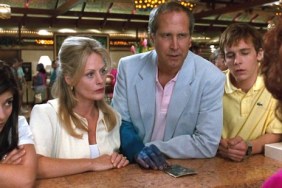Welcome, my dear students, back to the 103rd week in CraveOnline‘s Free Film School. Warning: Reading every single one of my lectures will make your brain grow to perhaps grotesque sizes, but your intelligence will only increase your wit, wisdom, and sex appeal. It’s been proven in labs that regular reading of the Free Film School will increase the number and frequency of your sexual encounters by a factor of at least 50. This is all true. I just lost the results in the mail.
This week’s lecture will be constructed around a very simple saying about movies that the late, great Roger Ebert tried consistently to coin, and a brief meditation on what the saying means. Ebert, alongside other critical heavy hitters like Leonard Maltin, probably saw more movies than any other person. Indeed, your average critic, whether or not you enjoy their writing or even respect their opinion, has probably seen more movies than you. From that fact, you could perhaps intuit that they are more familiar with certain movie clichés and tropes than most people, and have seen said clichés and tropes more often that you have. As such, certain stories often repeated in movies become predictable for we in the critical trade; we see a certain kind of story begin and we’ll be able to tell you with relative certainty how it’s going to end (also factoring in things like the movie’s familiar tone, the actors who appear in it, its pedigree, etc.). Many critics (or even just casual movie fans who have seen a goodly number of feature films in their day) often grow tired of such familiar stories, and typically give accolades to feature films that are the least bit different in any regard.
Then it makes sense that an old-guard movie fan like Roger Ebert should come up with the following lesson: “A movie is not about what it’s about, but how it’s about it.” In other words, a film’s story is not what’s important, but the telling of it.
In today’s critic-saturated age (pretty much anyone with a ‘blog and two opinions to rub together can call themselves a critic), there has been, I have noticed, a meticulous obsession with story. To the amateur critic, there is a list of blame that one can run down when negatively reviewing a movie. First to be blamed is always the director. Auteur Theory and all. Immediately thereafter, the screenwriter is to blame, although studio tinkering can also be a common culprit. Rarely blamed are the composer, editor, or cinematographer. Often a bad film will be called bad because of its stupid story. A good story, the theory goes, can go a long way to making a film good.

This is not a point I would dare argue. A good story is a good story. An aspiring screenwriter should lay out an outline, come up with dramatic beats, and even cleave to The Hero’s Journey, if they feel it fits their particular work. But, if we’re going by what Ebert says, a good story means nothing if it’s not being told in a particular way. You may be able to put down an interesting one-sentence plot summary on apiece of paper and make it sound good, but the actual execution, context, message, staging, or reading could color that good story. A feature film is a large and complex and multifaceted organism, usually employing the varied talents of many, many people, all of whom bring a unique voice to the project. That means there are myriad tellings of a story within the story being told, if you can follow my odd logic. In short, this means there are plenty of opportunities to cock it up, reshape it, retell it in new and subtle ways. After a while, a film begins to seem less like a single story being told (however good or bad) and more like the textured entity it is.
I suppose the ultimate point of Ebert’s statement seems to be that story is, at the end of the day, less important to the entire filmmaking process than most critics and viewers tend to give it credit for. Anyone who has seen a large number of films can attest to this. How often have you seen a film that resembles an earlier one? How often are stories re-used and recycled in Hollywood blockbusters? Heck, we live in a decade wherein remakes, reboots, and re-tellings of superhero origin stories are de rigueur. Movies like Lord of the Rings, Harry Potter, Twilight and The Hunger Games do boffo business, mostly amongst the people who were fans of those films’ literary source material. We often know the stories going in.
So, in many ways, it’s not the story we’re reacting to, or even necessarily what we care about. Again, if you’re writing a movie, you should have a story that you at least find personally interesting. But the truth of the matter is (and this is another common critical platitude) any story can work if it’s told right.

So if it’s a story about a brave robot which is powered by a dozen penguin brains breaking into Fort Knox to leave a valentine for his true love whom he know won’t be born for 1000 years… that might work. Sure, some films sound dumb, and could very easily turn out to be dumb, but that wasn’t necessarily because that film had a bad story. Case in point, here’s an example of one of the dumbest sounding movies I have ever encountered: James Lorenz’ Swirlee, a notoriously uncompleted film from about 20 years ago. The setup was that it was a gritty crime drama in every respect, only the main character is a man with a gigantic ice cream cone for a head. On paper, that sounds like a horrid idea, but when you learn more about the production (James Lorenz is a visual artist who played the lead role in Frankenhooker) you might think that Swirlee had the potential to, at the very least, be a delirious cult classic. It would all have to be, as they say, in the telling. Sadly, Swirlee never got made.
How does a story fail, then? It could be, perhaps, that the filmmakers just didn’t tell that story right. Other subtle visual elements like characterization, pacing, tone, or even subtle visual cues got in the way of the full enjoyment of the film. Viewers are smart. They can pick up on these subtle visual cues without even realizing it, and think a film is good or bad depending on how it makes them feel. When people complain about the failings of a story, I often feel that it wasn’t necessarily the story that failed, but the storyteller. If the film is exciting and engaging, it’s likely that story flaws will be overlooked. If you look at the critical response to The Avengers, for instance, you’ll find that most critics and audiences loved its bold and bright energy, and few seemed to mind the minor story flaws here and there. Compare that to the response from last year’s Prometheus, also a highly anticipated sequel that left many audiences cold. Prometheus was savaged by Alien fans for it’s odd story conceits, and difficult-to-suss-out motivations. If people responded to Prometheus, those holes would not have mattered. Ultimately how good a film is will have much more to do with the making, and less to do with the story.
(To stress my point again, though: A good story is still the best place to start. I don’t want to sound like story is entirely dismissible. I just want to introduce the notion that it may not be as important as you think it is.)

Ebert’s aphorism may also have been intended to act as a salve for arguments over content. Consider the notion of violence in movies. When Pulp Fiction came out in 1994, it was hotly debated for its then-unprecedented levels of blood and brutality. Many media watchdog groups harshly lambasted Pulp Fiction as a bilious and irresponsible piece of violence glorification, and many comparisons were made to mindless slasher films from about the same era, say, Jason Goes to Hell: The Final Friday. Both films feature extreme levels of blood and violence, but it doesn’t take a very sophisticated person to see that one of them is not an exploitation movie. Quentin Tarantino was not including blood and gore for cheap, prurient thrills. He was using reference, technique, and purely cinematic tools to bring new life to an old kind of crime story. Jason Goes to Hell, on the other hand, is an exploitation movie through and through with violence (and nudity!) that is only intended to shock and titillate on a very base level. As such, each movie is not about its violence, but how it’s about it.

Indeed, this separation of content from presentation is often used in court cases involving censorship. What is the difference between a porn film, for instance, and a film that features images of hardcore sex that are used for dramatic purposes? Why it’s all in the telling. Most people would be able to sit in front of your average adult feature and intuit that the filmmakers’ primary intent is base arousal. Those same people could sit in front of a more thoughtful sex film like John Cameron Mitchell’s Shortbus (a 2006 film that notoriously featured real, unsimulated sex on camera) and see that this is a drama that is using sex for storytelling purposes.
So the next time you see a movie, try to objectively judge what it is you’re reacting to. Is the story really taking you to new places? Is it giving you twists and turns? Is it a classic re-used story, or a brand new one? Is one of those better than the other? Try to keep in mind Ebert’s aphorism. Is this movie about what it’s about, or is it about how it’s about it? Food for thought.
Homework for the Week:
Do you think Ebert’s words hold true? How important is story to a movie? Can a good movie have a bad story? Can a bad movie have a good story?
Witney Seibold is a featured contributor on the CraveOnline Film Channel, co-host of The B-Movies Podcast and co-star of The Trailer Hitch. You can read his weekly articles B-Movies Extended, Free Film School and The Series Project, and follow him on “Twitter” at @WitneySeibold, where he is slowly losing his mind. If you want to buy him a gift (and I know you do), you can visit his Amazon Wish List.








